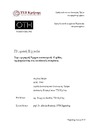| heal.creatorName | Αεράκη, Μαρία | el |
| heal.creatorName | Aeraki, Maria | en |
| heal.publicationDate | 2017-09-06 | |
| heal.identifier.primary | http://hdl.handle.net/20.500.12688/8358 | |
| heal.abstract | Η παρούσα εργασία έχει ως σκοπό να παρουσιάσει τις βασικές αρχές του κλάδου της Συμπεριφορικής Χρηματοοικονομικής. Η δημιουργία και ανάπτυξη του κλάδου είναι απόρροια των σφαλμάτων που έχουν εντοπιστεί και καταγραφεί στην διεθνή βιβλιογραφία σε βασικούς πυλώνες της παραδοσιακής χρηματοοικονομικής θεωρίας όπως η υπόθεση της αποτελεσματικής αγοράς, η υπόθεση ότι όλοι οι επενδυτές είναι ορθολογικοί και λειτουργούν με βάση το ευρέως αποδεκτό οικονομικό υπόδειγμα συμπεριφοράς κάτω από συνθήκες ρίσκου– την Θεωρία Προσδοκώμενης Χρησιμότητας, αλλά και το ορθολογικό Arbitrage. Για τον λόγο αυτό στα δύο πρώτα κεφάλαια παρουσιάζονται οι θεωρίες αλλά και οι αντικρουόμενες απόψεις σχετικά με την εφαρμογή τους, ενώ η εισαγωγή στον κλάδο της Συμπεριφορικής Χρηματοοικονομικής γίνεται στο τρίτο κεφάλαιο όπου εξετάζονται οι επενδυτικές αποφάσεις των ατόμων μέσα από ένα φάσμα ψυχολογικών παραγόντων οι οποίοι και συμβάλουν στην διαμόρφωση των τελικών αποφάσεών τους. Τέλος, η εργασία συνοψίζει με την χρησιμότητα και τον ρόλο που θα μπορούσε να επιτελέσει ο συγκεκριμένος κλάδος στην νεοκλασική οικονομική θεωρία. Να σημειωθεί ότι η ραγδαία ανάπτυξη του τομέα είχε ως αποτέλεσμα την δημιουργία τεράστιου όγκου δεδομένων, αναλύσεων και ερευνών και καθιστά αδύνατο να παρουσιαστούν στην παρούσα εργασία. Το θέμα προς εξέταση, θα ακολουθήσει μία πιο γενική και θεωρητική προσέγγιση. | el |
| heal.abstract | This paper aims to present the basic principles of Behavioral Finance. The creation and development of this field is the outcome of the errors identified and mentioned in literature all around the world, concerning the pillars of traditional financial theory such as the efficient market hypothesis, the assumption that all investors are rational and operate based on the widely accepted economic behavior under conditions of risk - Theory of Expected Utility, and also the rational Arbitrage. For this reason, the first two chapters present the theories and the conflicting views on their implementation, while the introduction to Behavioral Finance is located in the third chapter where the investment decisions of individuals are examined through a range of psychological factors, which shape the final outcome. Finally, the paper summarizes the utility and role of the sector in classical economic theory. It should be noted that the rapid growth of the field has resulted in the creation of huge amount of data and researches, thus it’s impossible for everything to be presented in this paper. The matter to be examined will follow a more general and theoretical approach. | en |
| heal.language | Ελληνικά | el |
| heal.language | Greek | en |
| heal.academicPublisher | Τ.Ε.Ι. Κρήτης, Σχολή Διοίκησης και Οικονομίας (Σ.Δ.Ο), Τμήμα Διοίκησης Επιχειρήσεων (Ηράκλειο) | el |
| heal.academicPublisher | T.E.I. of Crete, School of Management and Economics (SDO), Department of Business Administration (in Heraklion) | en |
| heal.title | Συμπεριφορική χρηματοοικονομική: ο ρόλος της ψυχολογίας στις επενδυτικές αποφάσεις. | el |
| heal.title | Behavioural finance: the role of psychology in investment decisions. | en |
| heal.type | Πτυχιακή Εργασία | el |
| heal.type | Bachelor thesis | en |
| heal.keyword | συμπεριφορική χρηματοοικονομική, επενδυτική απόφαση | el |
| heal.keyword | behavioral finance, investment decision | en |
| heal.access | free | el |
| heal.advisorName | Ξανθός, Γεώργιος | el |
| heal.advisorName | - | el |
| heal.advisorName | Xanthos, Georgios | en |
| heal.advisorName | Bresinsky, Markus | en |
| heal.advisorID.email | xanthosg@staff.teicrete.gr | |
| heal.academicPublisherID | Τ.Ε.Ι. Κρήτης | el |
| heal.academicPublisherID | T.E.I. of Crete | en |
| heal.fullTextAvailability | true | el |
| tcd.distinguished | false | el |
| tcd.survey | false | el |


